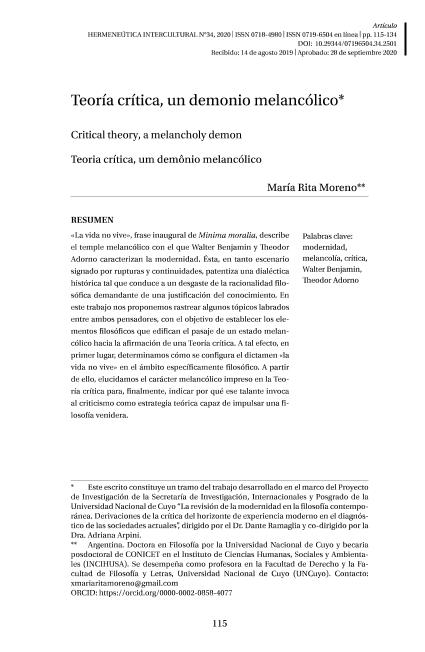Mostrar el registro sencillo del ítem
dc.contributor.author
Moreno, María Rita

dc.date.available
2021-09-27T18:57:13Z
dc.date.issued
2020-12
dc.identifier.citation
Moreno, María Rita; Teoría crítica, un demonio melancólico; Universidad Católica Silva Henríquez; Hermenéutica Intercultural; 34; 12-2020; 115-134
dc.identifier.issn
0718-4980
dc.identifier.uri
http://hdl.handle.net/11336/141643
dc.description.abstract
"La vida no vive", frase inaugural de Minima moralia, describe el temple melancólico con el que Walter Benjamin y Theodor Adorno caracterizan la modernidad. Ésta, en tanto un escenario signado por rupturas y continuidades, patentiza una dialéctica histórica tal que conduce a un desgaste de la racionalidad filosófica demandante de una justificación del conocimiento. En este trabajo nos proponemos rastrear algunos tópicos labrados entre ambos pensadores con el objetivo de establecer cuáles son los elementos filosóficos que edifican el pasaje de un estado melancólico hacia la afirmación de una Teoría crítica. A tal efecto, en primer lugar, determinamos cómo se configura el dictamen «la vida no vive» en el ámbito específicamente filosófico. A partir de ello, elucidamos el carácter melancólico impreso en la Teoría crítica para, finalmente, indicar por qué ese talante invoca al criticismo como estrategia teórica capaz de impulsar una filosofía venidera.
dc.description.abstract
“Life does not live,” the opening phrase of Minima Moralia, describes the melancholic temperament with which Walter Benjamin and Theodor Adorno characterize modernity. This, as a scenario marked by ruptures and continuities, shows a historical dialectic that leads to an erosion of the philosophical rationality that demands a justification of knowledge. In this work, we propose to trace some topics worked out between both thinkers, to establish the philosophical elements that build the passage from a melancholic state to the affirmation of a Critical Theory. To this end, first of all, we determine how the opinion that “life does not live” is configured in the specifically philosophical sphere. From there, we elucidate the melancholic character printed in the Critical Theory to, finally, indicate why this mood invokes critique as a theoretical strategy capable of promoting a future philosophy
dc.format
application/pdf
dc.language.iso
spa
dc.publisher
Universidad Católica Silva Henríquez
dc.rights
info:eu-repo/semantics/openAccess
dc.rights.uri
https://creativecommons.org/licenses/by-nc-sa/2.5/ar/
dc.subject
MODERNIDAD
dc.subject
MELANCOLÍA
dc.subject
CRÍTICA
dc.subject
WALTER BENJAMIN
dc.subject
THEODOR ADORNO
dc.subject.classification
Otras Filosofía, Étnica y Religión

dc.subject.classification
Filosofía, Ética y Religión

dc.subject.classification
HUMANIDADES

dc.title
Teoría crítica, un demonio melancólico
dc.title
Critical theory, a melancholy demon
dc.title
Teoria crítica, um demônio melancólico
dc.type
info:eu-repo/semantics/article
dc.type
info:ar-repo/semantics/artículo
dc.type
info:eu-repo/semantics/publishedVersion
dc.date.updated
2021-09-06T20:19:04Z
dc.identifier.eissn
0719-6504
dc.journal.volume
34
dc.journal.pagination
115-134
dc.journal.pais
Chile

dc.journal.ciudad
Santiago de Chile
dc.description.fil
Fil: Moreno, María Rita. Consejo Nacional de Investigaciones Científicas y Técnicas. Centro Científico Tecnológico Conicet - Mendoza. Instituto de Ciencias Humanas, Sociales y Ambientales; Argentina
dc.journal.title
Hermenéutica Intercultural
dc.relation.alternativeid
info:eu-repo/semantics/altIdentifier/url/https://doi.org/10.29344/07196504.34.2501
Archivos asociados
